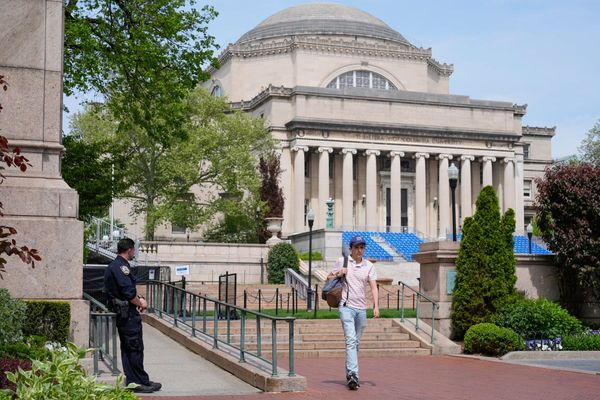
Akieem Stewart was sitting under a mango tree in the backyard of a neighbour’s house writing a text message on his mobile phone when he came face to face with a member of the Jamaica constabulary force. Within seconds he was dead.
Stewart was 22, and had been about to take up a post as a hotel manager – his first job since finishing college. That Sunday in March, his mother Latoya Brown was at work at the ministry of health in the city.
Halfway down the street, his grandmother had just returned from church to the family home, one of a collection of low-rise concrete houses in the Elletson Flats neighbourhood on the northern outskirts of the Jamaican capital.
“The last time I saw him was in the morning when I woke up,” said Brown. “His girlfriend had done his hair; he was saying, ‘How does this look mum?’ I told him he had to get a haircut because he was starting work.”
At around 3pm, Brown’s phone rang. “There was screaming in the background, it was my mum trying to say something, then the phone went dead. Then my mum rang back, she said: ‘Akieem got shot up, him got shot up and it look like him dead.’”

Stewart’s grandmother Sylvia Morris clasps her hands to her face and shakes her head as she points out the spot where Stewart was killed: a small blue bench near a rickety chicken coop.
“When I saw him after church, he told me to make him some peas and chicken, and some chips,” said Morris. “Then he went down to see him friend, but he wasn’t there so he was texting him. In a few minutes I heard four shots fired. I ran out and could see a jeep in the street. Dem police told me, don’t go there granny but I ran round the corner to the backyard. He was sitting there slumped on the bench. I saw him drop,” she said. “Then one of the police threw him in the van, the other picked up the shells off the ground and threw them in the bush, right in the bush.”
Stewart is one of 93 civilians killed by Jamaican police this year. In a country of 2.8 million people which is awash with guns, and where powerful gangs have taken over inner-city areas so neglected by the state they have no running water or sanitation, the police have a reputation for being one of the deadliest security forces in the world.
Over the past decade they have gunned down about 200 people a year, to the condemnation of human rights groups across the world. They include a woman who was seven months pregnant – shot in the head after she used what the police said was indecent language – and a 14-year-old boy killed a week before Stewart in the same neighbourhood.
Perhaps unsurprisingly, the police account of Stewart’s death is different from that of his family. In a report seen by the Guardian, officers said they were following information that armed men were in a house in Elletston Flats when they were fired on by a group of men. They returned fire and the men fled, except one – Stewart – who was found suffering from gunshot wounds. A firearm was recovered from the scene, the police report states.

Accounts provided by police after fatal shootings over the years have been accepted with little robust challenge. Jamaica has a bad record of holding those officers responsible for such killings to account.
But Stewart’s death is being investigated by the country’s first independent police complaints commission, known as Indecom. Headed by a former prosecutor, Terrence Williams, and a retired British homicide detective, Hamish Campbell, the unit is 100 strong and made up of unarmed civilians.
Indecom investigator Isaiah Simms has been back to the scene several times, taken possession of Stewart’s mobile phone, and uncovered crucial evidence that directly conflicts with the police account. It suggests Stewart thrust his arms into the air and shouted “not me, not me” before he was killed.
Founded five years ago after pressure from the United States over the scale of human rights abuses by security forces in Jamaica, Indecom has in the past two years charged 98 officers with serious offences – including 58 with murder. Several cases involve allegations that police planted firearms on victims at the scene.
Ripples from Indecom’s investigations are beginning to reach the top echelons of the Jamaican constabulary and ruffle the feathers of politicians in the ruling People’s National party, some of whom accuse the watchdog of tying the police’s hands with overzealous investigations.
“For many years the solution to our crime problem was to give the police more powers, and people have not been sufficiently curious about the rising rate of police killings,” said Williams. “There has been a feeling that you don’t want to damage police morale. But it is only if you have a tacit acceptance that police can act outside the law, that you could think that we are tying their hands.”
In the last year and a half, the number of police killings has dropped sharply, by 53% in 2014 – a downturn Williams believes is down to the deterrent effect of his unit.
“I want to get to the stage where police fatal incidents are so infrequent each one can receive a quality investigation. At the moment we are investigating 1,200 suspected police homicides; there is no other civilian body in the world doing that, and we are having to prioritise the cases to bring the strongest ones to court,” he said.
A few miles away from where Stewart died, in the national conference centre’s wood-panelled hall, a team of lawyers pick over one of the worst cases of alleged mass executions by the security forces for many years. A public inquiry is examining the deaths of 76 civilians in the inner-city ghetto of Tivoli Gardens during the 2010 manhunt for drug lord Christopher “Dudus” Coke.
Witnesses come each day to give testimony about police officers pulling young men from their homes and shooting them dead at close range.
Marjorie Williams told the hearing of the moment her two sons Fernando and Fabian “Poopsie” Grant were killed. “I hear Fernando cry out, then I heard an explosion. I hear Fernando say, ‘Mummy dem kill “Poopsie”’.”
She stated she heard a police officer tell them: “Shut up boys, you going to die today.”
Louise Tillotson, Caribbean researcher for Amnesty International, said the public inquiry should represent a line in the sand for the Jamaican state, as its own employees were accused of engaging in the killings of large numbers of civilians.
“These hearings are long overdue,” said Tillotson.
“The outcome of this inquiry will be critical. We believe the commission must refer matters to prosecuting bodies if it obtains evidence of individuals being responsible for human rights abuses.”
Fresh details of human rights abuse allegations will emerge in January when criminal trials begin around one of the biggest murder cases being investigated by Williams’s team.

A group of officers based at the May Pen police station in Clarendon – a rural district 55km (34 miles) west of Kingston – are accused of murdering 60 civilians over four years, then covering their tracks by recording the crimes as civilian murders.
The alleged death squad was exposed in January 2013, after a killing at a local hospital.
The victim, Adif Washington, had been shot and wounded after reporting to a local police station under bail conditions for an outstanding murder charge. Two days later, a masked gunman forced his way into the hospital ward where Washington was recovering, and shot him at close range.
The investigation which ensued turned up evidence suggesting Washington’s killer was not a gangland rival, but a police officer finishing off a botched execution.
Ballistics experts working for Indecom found a bullet fragment at the scene that matched the service weapon of a police corporal at May Pen station. He has been charged with the murder of Washington and three other men, one of 12 Clarendon officers charged with killing 10 civilians.

During a raid by Indecom staff at the May Pen station more than 90 shell casings were found, reinforcing suspicions long held in Jamaica that police collect shells from crime scenes to cover their tracks.
US pressure on Jamaica has grown as details of the so-called Clarendon “death squad” emerges. The commissioner of the police, Owen Ellington, has stepped down, and US authorities are understood to be revoking visas of police who may be linked to the Clarendon killings.
For the family of Akieem Stewart, the signs that the officers may no longer enjoy impunity for their actions provide a glimmer of hope.
Stewart’s mother still struggles to believe that her son is gone. The family had been looking forward to him starting his hotel job, something of a rarity in a country where the unemployment rate for under-24s runs at more than 34%.
“I pray every night for justice, for this policeman to go to prison for a long time,” Brown said. “My son begged for his life. I brought my son up in a disciplined way, I never heard him curse. They smeared him by saying he had a gun, and that smear lasts now he is dead.”
Horace Levy, of the campaign group Jamaicans for Justice, said that although investigations were finally bringing officers to court, it was much too early to believe the culture of policing would change.
“There is no sign of the tide turning yet,” he said. “What the work of Indecom and the commission of inquiry into Tivoli are strongly indicating is that something is seriously wrong in the police force that needs to be urgently addressed. The police force in this country needs to be completely disbanded in order to tackle these endemic problems.
“But whether that will happen we can’t say, because at the end of the day it will be up to the Jamaican government to act.”







